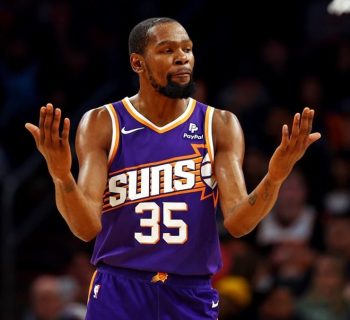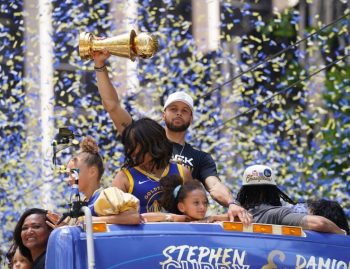NBA
NCAA PM: The Most Shocking Final Four Teams

History’s Most Surprising Final Four Teams
With Dayton’s win on Thursday night, they now sit a single victory away from what would be an undeniably improbable run to the Final Four, but it’s not like an 11-seed has never done it before. That is the lowest seed to ever make it that deep into the tournament, but it’s only happened a few times ever. Nobody expects teams rated that poorly to be one of the last teams standing, which is precisely why nobody in the world still has a perfect bracket.
Surprises are what fans seem to love most about this tournament, though, so here’s a look back at some of the most surprising Final Four teams since the NCAA expanded to the field to 64 teams 29 years ago:
Wichita State (9th seed in 2013) – While we now view the Shockers as something of a powerhouse coming off a season in which they did not lose a regular season game and entered the NCAA Tournament as a No. 1 seed, a year ago they were a rag-tag assemblage of cast-offs and former junior college players that, as a mid-major, entered the tourney with very low expectations. They won early, though, and didn’t stop winning until bowing out to Louisville in their Final Four matchup. Louisville would, obviously, go on to win the championship and Wichita State would use their tourney momentum to help lead them into a record-setting season, but teams seeded that low—particularly from smaller universities—tend not to fare so well in the tournament. That group of Shockers truly did shock everybody in ’13. The headlines essentially wrote themselves.
Virginia Commonwealth (11th seed in 2011) – The really cool thing about VCU a few years ago was that they started as a “First Four” team, meaning they actually had to play their way into the field of 64. By the time their incredible run was over, they had actually played themselves into the Final Four, knocking off a No. 6, No. 3, No. 10 and No. 1 seed to get there. They were one of only three 11-seed teams to ever make it that deep into the tournament, though Dayton and Tennessee sure hope to join that club in 2014.
George Mason (11th seed in 2006) – The only reason most of the general public has even heard of George Mason University is because of the team’s incredible run back in ’06, which was about as hard-earned as a Final Four spot has ever been. George Mason had to topple No. 6 Michigan State (a Final Four team the previous year), No. 3 North Carolina (the defending champions) and No. 1 Connecticut (the title favorites that year) to make it as far as they did. The improbability factor on this particular Final Four run is about as high as it gets.
Wisconsin and North Carolina (both 8th seeds in 2000) – Before Y2K, there had never been an instance of a Final Four featuring two teams seeded lower sixth, but the Badgers and Tar Heels were happy to help make history that year by both getting in as 8 seeds. Both teams were 18-13 in the regular season, neither team won four games in a row during the regular season and both played lower seeds in their regional finals. Both also had to knock off No. 1 seeds to win their regions, putting the finishing touches on a double Cinderella run that proved extremely entertaining.
Michigan (6th seed in 1992) – To be fair, the Fab Five, which included Chris Webber, Juwan Howard and Jalen Rose, deserved a higher seeding than No. 6, but when the dust all cleared, the most memorable all-freshman starting lineup in NCAA history proved why a 6-seed was entirely too low for them. They beat a No. 4, No. 2 and No. 1 seed to find themselves pitted against Duke in a championship game they would eventually lose, but they absolutely took the country by storm that year. A strong tournament finish helped make them all legends.
Kansas (6th seed in 1988) – When a team has a player as gifted as Danny Manning, selected as the No. 1 overall pick in the NBA draft a few months after the tournament, anything is possible, and the Jayhawks proved that in 1988 by defeating every team they bumped up against in the tournament that year en route to a championship. “Danny and the Miracles,” as a 6-seed, were the second-lowest seed to ever win the whole thing, making them one of the most shocking NCAA champions of all time.
Providence (6th seed in 1987) – This Final Four appearance was the first for head coach Rick Pitino, who would go on to coach several more great teams, including our most recent champions. But it was also the first for eventual Florida head coach Billy Donovan, who was a guard under Pitino for this surprisingly deep run.
LSU (11th seed in 1986) – Arguably the greatest Cinderella team ever, the ’86 Tigers were the first-ever double-digit seed to make the Final Four. While they did beat No. 6, No. 3, No. 2 and No. 1 seeded teams to get there, the fact that their first two games were played on their home court in Baton Rouge certainly didn’t hurt their chances at making it to at least the Sweet Sixteen. We have this team to thank for modern-day teams not playing tournament games on their home court because it just proved to be too big an advantage for LSU in 1986.
Villanova (8th seed in 1985) – As the lowest seed to have ever won the NCAA title, Villanova has to be considered one of the most impressive underdogs in history. They knocked off two No. 1 seeds and two No. 2 seeds en route to their championship, which included a win over Patrick Ewing’s Georgetown, in which Villanova shot a blistering 78 percent from the field. They shouldn’t have won a lot of the games they did in that tournament, but the fact that they did makes them the most unbelievable champions in the history of the tournament.
North Carolina State (6th seed in 1983) – This team, led by beloved coach Jim Valvano, stole away one of the most memorable championship games in the history of the sport. We’ve all seen the Lorenzo Charles dunk in the closing seconds of this game, usually in slow motion, and it just never gets old. When you realize this Wolfpack team beat a Houston roster that featured Hakeem Olajuwon and Clyde Drexler, it becomes all the more incredible that such a thing was done by a 6-seed. This was before the field was expanded to 64 teams (it was 52 teams that year), but still a pretty incredible accomplishment.
More often than not, it’s one of the “best” teams that wins the tournament, with 18 of the last 29 tournament champions having been No. 1 seeds. In fact, only twice in that time has a team with a seed lower than No. 4 taken all the bacon, which doesn’t bode well for the title hopes of teams like Dayton and Tennessee.
Despite that, a Final Four appearance carries plenty of prestige on its own, and should either of this year’s remaining 11 seeds make it that far, we can add them to this list next year. Unless you’ve got a kid on one of those teams or went to college at one of those schools, there’s no way you picked them for the Final Four. But even with busted brackets, college basketball fans love a good surprise. The above list represents the best of those surprises over the course of the last three decades.













